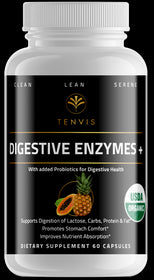
May 15 , 2021
How to Get Enough Vitamin D
Essential Nutrition: Ensure You’re Getting Enough Vitamin D
You probably know that vitamin D is important for strong bones, but new research shows that it packs many additional exciting health benefits as well like supporting our immune systems. Even though our bodies make this nutrient naturally when we're exposed to sunlight, more than one billion people worldwide suffer from a vitamin D deficiency!
Our bodies absorb vitamin D from three sources: sunlight, food and supplements. Here are some basic facts about vitamin D and easy ways to ensure you're getting enough.
Basic Facts About Vitamin D
Understand how vitamin D strengthens your bones. Vitamin D is also a hormone. It helps with regulation and maintenance of calcium and phosphorus and to help build strong bones and teeth while reducing your risk of osteoporosis.Boost your immune system. Vitamin D helps to boost your body’s immune response by switching genes on and off throughout the body such as certain peptides that trigger an anti-microbial response. This helps your body with its natural process of fighting off infections.
Protect your physical health. Studies are discovering more good stuff about the sunshine vitamin. It can also help protect you from certain cancers, heart disease, asthma, type 1 and type 2 diabetes and hypertension as it helps blood pressure regulation in the kidneys and blood sugar levels in the pancreas.
Learn about the mental health benefits. Vitamin D may also help you to think and feel better. In older adults, it's been found effective in improving cognitive functions and alleviating depression.
Recognize the risk factors for vitamin D deficiency. As we age, our kidneys have to work harder to convert vitamin D into its active form, so we may need supplements. The same is often true for mothers breastfeeding infants, people with darker skin, and those with conditions like Chron's disease or milk allergies.
Know your individual needs. The Vitamin D council recommends 5000 IU of vitamin D3 (120 micrograms). We recommend getting tested for your vitamin D levels if you are wondering what the right amount is for you. While bone pain and muscle weakness are possible, the symptoms of vitamin D deficiency are often very subtle. Your doctor can give you a simple blood test to be sure. It's called a 25 hydroxyvitamin D test and blood levels of 20 nanograms per milliliter are usually considered healthy.
Talk with your doctor about drug interactions. Some drugs like steroids can lower vitamin D levels while others like statins can raise them. Your doctor can help you find a safe level for you.
Easy Ways To Get Enough Vitamin D
- Be smart about sun exposure. Our bodies are very efficient at making vitamin D, so keep using your sunscreen to prevent skin cancer and premature aging. About 10 minutes a day on your arms may be all you need, especially if you live in a sunny climate. However this can vary depending on where you live and your ethnicity, which is another reason why you may consider getting your vitamin D levels tested if you are concerned.
- Eat mushrooms. According to One Green Planet, "mushrooms contain a precursor to the creation of vitamin D, ergosterol, which is then turned into vitamin D with the help of UV rays. This, in turn, boosts the amount of vitamin D created within your body without having to absorb as much sunshine.” Button, cremini, portabella are commonly seen in stores but there are a wide variety of mushrooms and supplements that you can order, make sure you use a reliable source.
- Eat more fatty fish. Fish and fish oil are among the most potent sources of vitamin D. Three ounces of salmon will cover all your daily needs. When we shop for salmon we look for wild and sustainably caught brands.
- Consider supplements. Supplements come in two forms. Both D2 and D3 versions are good for you; however, D3 is the better choice because it's closer to the natural vitamin D your body produces. Therefore, the effects are quicker and last longer as it’s easier for your body to absorb. Look for our new Vitamin D3 + K2 supplement on our website to maximize the health benefits!
-
Add other vitamin D fortified foods to your diet. More good choices include yogurt, plant based milk or milk, breakfast cereals and orange juice. Check the labels to be sure of what you're getting and know that these are usually fortified with vitamin D2.
- Maintain a healthy body weight. Excess fat cells also block the absorption of vitamin D. That's one more good reason to watch your calories and exercise regularly.
Vitamin D is important for your bones and overall health. Meet your requirements through sensible sun exposure and a healthy diet or talk with your doctor if you think you need supplements. This information is not meant to diagnose, mitigate, treat, cure, or prevent disease.
JC DAVIS, Co-Founder Tenvis Nutrition, MPAS, ACE Certified Health Coach
This is not personal medical advice and we recommend that you talk with your doctor before making changes to your lifestyle and nutrition plans.

